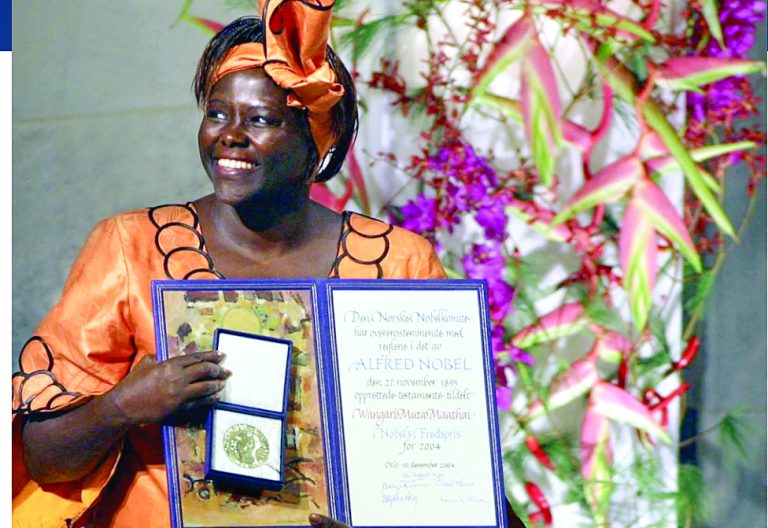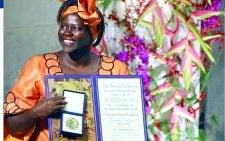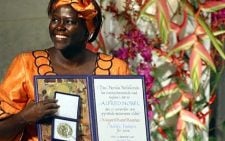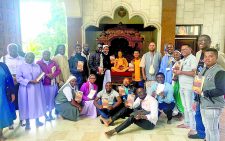Wangari Maathai: Pioneer in environment protection

The mention of the late Professor Wangari Maathai’s name evokes memories of an environmental warrior, a fearless activist, and a champion of women’s empowerment.
Though she is primarily remembered for her unwavering commitment to environmental conservation, her impact extended far beyond that.
Interestingly, her legacy continues to thrive more than a decade after her demise. Overcoming societal barriers Born in 1940 in Nyeri, Kenya, Wangari shattered barriers from an early age. She was among the first African women to earn a PhD, obtaining a doctorate in veterinary anatomy from the University of Nairobi in 1971.
But beyond academia, she saw the struggles of rural women. Deforestation had stripped their land bare, leaving them without firewood, food, or water.
This realization set her on a lifelong mission to restore Kenya’s green cover. To manage this, in 1977, Wangari founded the Green Belt Movement, an initiative that mobilized women to plant trees, reclaim degraded land, and fight for their rights.
What started as a small tree-planting effort soon became a powerful environmental and human rights movement. Under her leadership, millions of trees were planted, not just in Kenya but across Africa. But Wangari’s activism came at a cost.
She faced arrests, government persecution, and violent attacks. She famously led protests against land grabbing in Nairobi’s Karura Forest and Uhuru Park, standing her ground even when faced with brutal police force. Her relentless efforts earned her international recognition. In 2004, Wangari Maathai was the first African woman to receive the Nobel Peace Prize.
The award recognized her unique approach to peace and sustainable development one rooted in environmental conservation, democracy, and women’s empowerment. Taking advocacy to the global stage Following the Nobel win, she took her advocacy to the global stage, serving as a UN messenger of Peace and playing a key role in the Billion Tree Campaign.
She continued to push for policies that promoted environmental stewardship until her passing in 2011. More than a decade later, Wangari’s impact remains undeniable.
The trees she planted stand tall, the women she empowered continue to fight for their rights, and the environmental movement she sparked is stronger than ever. Institutions like the Wangari Maathai Foundation and the Wangari Maathai Institute for Peace and Environmental Studies ensure that her vision
A source of inspiration Her work also motivated young girls and women who have ensured the fight continues. One such example is Wangeci Kiongo, who grew up inspired by Wangari Maathai’s story of environmental advocacy and resilience.
Captivated by her legacy, Wangeci aspired to embody even a fraction of the hero she was.
“Her unwavering commitment to conservation deeply influenced my passion and career path, driving me to integrate environmental stewardship into every role I have held since 2016,” says Wangeci. Beyond conservation, Wangeci says that Wangari taught her the power of fearlessness, especially in standing up for what is right and just.
She vividly recalls 2016 when together with her friend they faced threats for advocating against unsustainable hydropower dams that posed a danger to Lake Turkana. During those difficult times, they constantly asked themselves: What would Wangari Maathai do if she were the one in such a situation? Re-reading her memoir, Unbowed, became their source of strength and reaffirmed their mission
According to her, while she does not intend to limit her daughter to follow in Wangari’s footsteps as an environmentalist, she will ensure that she carries forward the same courage, resilience, and unwavering conviction to stand firm for what is right, no matter the challenge or opposition she may face. Clare Nasike is another woman who has been deeply influenced by Wangari Maathai’s legacy.
Thanks to her influence, she was able to pursue higher education in a field she deeply cherishes- environmental science. In 2015, she was honoured to receive the Wangari Maathai Scholarship, benefiting from her impact even posthumously.
Had Wangari not founded the Green Belt Movement, Nasike would not have had access to this scholarship, which not only enabled her to complete her undergraduate studies but also empowered her to establish a volunteer organization dedicated to teaching young schoolchildren in Kenya about the environment.
“Wangari’s legacy continues to inspire me, and I strive to carry forward her vision of environmental justice. I remember Wangari Maathai for her immense courage and bravery in standing up for justice and the protection of Kenya’s forests. She fearlessly challenged the Moi regime to safeguard Uhuru Park and Karura Forest, leaving behind a legacy of environmental activism,” says Nasike.
According to her, the knowledge she acquired has also given her the strength to stand up for justice in her country.
She has mobilized farmers, conducted policy research, and helped institute the court case on Kenya’s seed law to ensure the recognition of farmers’ rights to sell, share, and exchange their seeds.















